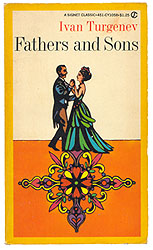 The one book I have kept coming back to again and again over the past 45 years is Ivan Turgenev’s Fathers and Sons, the Rosemary Edmonds translation in particular.
The one book I have kept coming back to again and again over the past 45 years is Ivan Turgenev’s Fathers and Sons, the Rosemary Edmonds translation in particular.
The book’s charms are many, beginning with the fact that it’s a Russian novel, but short.
It was Fathers and Sons that introduced me to the power of specificity. The moment the servant on the first page is pinned as a “man of the advanced modern generation” because of his “single turquoise ear-ring … dyed pomaded hair and … mincing gait,” I knew that details, rather than drama, would move the narrative forward. This wouldn’t be a story with sweeping generalizations or rambling asides. They’d be replaced by a “large speckled hen who strutted gravely about” and the “smell of warm rye bread.”
The way Turgenev achieved this effect in descriptions from nature, or in the portrayal of minor characters, seemed obvious enough, but the way he did it in the creation of major characters mystified me. Bazarov, the scientific materialist and occasional physician, rises to the height, or sinks to the depth, of misogyny when he responds to Madame Odintsov’s beauty by saying he would love to see her body “on the dissecting table.” But still, he remains a compelling figure in the book—multidimensional, magnetic. And his admirer Arkady, sentimentalist though he proves to be, likewise doesn’t invite our ridicule or contempt. The two friends prove to be twin vines coiling around the trunk of the same tree.
I first read Fathers and Sons when I was 22. I’d grown up in Birmingham, Alabama, at the height of the American civil rights movement. My father was a segregationist. I was not. In college, I protested against the Vietnam War. My father supported the war, even after I had been drafted into the army. And I thought, when I opened the pages of Fathers and Sons, that the book would somehow support my side of the arguments we’d endured.
Turgenev’s characters did provide the possible answers to a series of heated questions about art, nature, politics, psychology, and spirituality.
But with his depiction of Arkady’s father and Bazarov’s parents, he answered the most important question: Is love real?
Fathers and Sons was the means by which Turgenev said yes.

